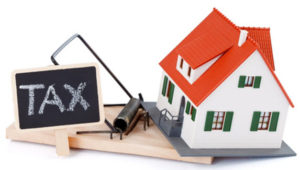 A shocking story out of Callahan County was reported in May by KRBC in which it was learned that property owners across the county are facing huge appraised value increases for the purposes of property taxation (ad valorem taxes.)
A shocking story out of Callahan County was reported in May by KRBC in which it was learned that property owners across the county are facing huge appraised value increases for the purposes of property taxation (ad valorem taxes.)
This was an important line in that story: “A tax rate has not yet been set, so residents don’t know for sure yet what they will be paying in taxes this year.”
That is the key issue ignored in counties big and small and in most media reporting: The appraised value doesn’t decide whether, in aggregate, local government property taxes go up or down. That is decided by the tax rate set by local officials such as county commissioners, school board members, and city council members.
Local officials have been hiding their decisions to raise taxes behind appraisal increases for decades.
Callahan County has been ordered to raise valuations because state law requires appraisals for property tax purposes to be near 100 percent of market value and an audit found local appraisals to be well under such. The reason behind this requirement is to ensure that local officials do not under appraise so that they get more from the state for school districts. The school funding formula is a see-saw system in which lower tax value, or poorer, districts get more from state coffers than districts with higher local tax bases. Undervaluing local property is a cheat of the system to put more of the funding burden onto the backs of out of district taxpayers.
 On an individual basis, some property owners in Callahan County might see a property tax increase but only if their property tax valuation increase is higher than the average increase across the county.
On an individual basis, some property owners in Callahan County might see a property tax increase but only if their property tax valuation increase is higher than the average increase across the county.
Local officials have been hiding their decisions to raise taxes behind appraisal increases for decades. Callahan County gives us a good example of how it really works.
Let’s say that on average the Office of Comptroller found appraised value in Callahan County to be 30% below real market value. To be in compliance and at market value, appraised values would have to be raised 30% in the county. However, that adjustment doesn’t require a property tax increase come budget and tax rate setting time.
Every year appraisals are adjusted in every taxing jurisdiction across Texas and then after that is done, the appraising entities provide each local government with what is now called the No New Revenue Tax Rate (previously the Effective Tax Rate.) That rate is simply this: What tax rate do you need to set for the next year that will bring in the same amount of money from properties that were taxed in the previous year.
Even if appraisals were to rise 100 percent, a doubling, in your city, county, school district, or other taxing district, property taxes would not rise, in general, if your local officials adopt the No New Revenue Rate.
Another thing to know about that rate is that it must be published but is most often overlooked and unmentioned by tax raisers and local media. It is not possible to accurately report if property taxes were increased, kept flat, or lowered without that figure but such wrong reporting is commonplace.
Also note that the No New Revenue Rate doesn’t hold the local government to the same income as the previous year because it doesn’t include other sources of income or new property development. The No New Revenue Rate only applies to existing property that was taxed in the previous year.
Yes, appraisal increases are frustrating. However, except in the case of an individual’s increase being above the average increase across a taxing district, those appraised value increases do not raise your property tax burden.
Taxes go up when local officials decide they want more money from each taxable property’s owner than they got the year before. In other words, property taxes go up when local officials choose to spend more.
Read more explanations and commentaries on Texas property tax here.





















In Scurry County we often get higher appraisals AND higher taxes because our taxing entities are out of control!! 2024 budgets / tax rates are on the rise!!! Robert knows all too well about the swamp we have here!
It is a swamp but the higher taxes come from higher tax rates. If the city or county adopts the No New Revenue Rate very few people will see a tax increase. It’s all about the rates set not the average appraised value increase.